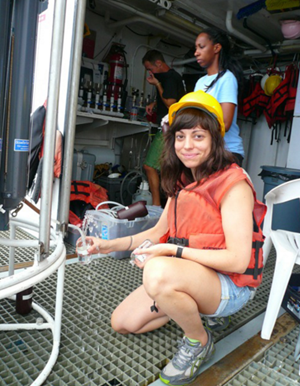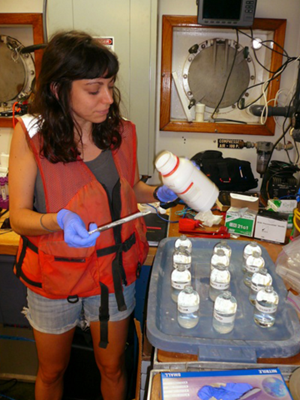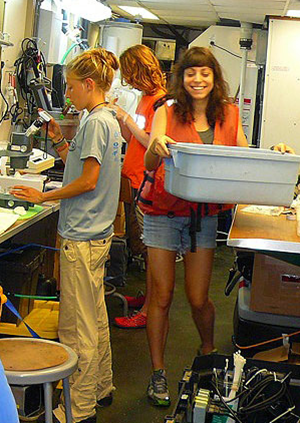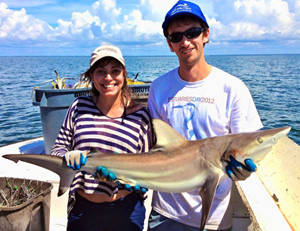
Alex Harper collects seawater samples from CTD Rosette Niskin bottles aboard R/V Weatherbird II. (Photo credit: Natalie Geyers)
Alexandra Harper, a passionate environmental advocate, is using her oceanography expertise to help “society better balance human need with ecological health.”
She is researching the potential relationship between the Deepwater Horizon oil spill and mercury levels in Gulf of Mexico fishes. Because rises in methyl mercury levels in fish increase chances of these toxins making their way into human diets, Alex hopes to advance scientific knowledge to inform future consumption warnings and environmental policies.
Alex is a Chemical Oceanography Ph.D. student at Florida State University (FSU) and is a GoMRI scholar with Deep-C. She shares her path of advocacy and research and her hopes for the future.
Her Path
Alex’s interest in environmental health began during her childhood in the Florida panhandle. Local groundwater quality was deteriorating because of faulty waste disposal and poor land management, practices that could eventually destroy the home she lovingly describes as “a watery wilderness marked by hundreds of crystal-clear freshwater springs and prehistoric cypress trees.” Seeing this first-hand has fueled her “lifelong commitment to protecting, conserving, and restoring our natural world.”

Alex Harper collects seawater samples from CTD Rosette Niskin bottles aboard R/V Weatherbird II. (Photo credit: Natalie Geyers)
However, Alex’s fight for the environment did not begin with the sciences. As a young college graduate, her early profession focused on social change to reshape and restore environmental land ethics. She interned for the U.S. Congress, first with her local Tallahassee congressman and then for Senator John Kerry’s (D-Mass.) press office. After a series of political and environmental campaigns, Alex became disillusioned with the adversarial nature of political and legal arenas and returned to school to study oceanography and strengthen her analytical and field skills. To support herself, she worked part time sampling storm water for a local ecologist. Alex now spends the majority of her time in a geochemistry lab as a doctoral student and the more she learns, the more her environmental concerns grow. She remains active in local clean water initiatives as she volunteers with Florida’s Water and Land Legacy Campaign.
Alex says that her research on mercury in the marine environment was “the result of pure opportunity.” A United States Geological Survey (USGS) Water Science Center researcher affiliated with FSU’s Oceanography Department had an opening for a graduate research intern to work with its new mercury analyzer. Meanwhile, one of Dr. Jeff Chanton’s Ph.D. students moved into a postdoc position, leaving behind enough fish samples for a rigorous mercury study. Alex had recently entered the FSU masters’ program in Environmental Science under Chanton, and he felt she was the perfect fit for the USGS lab vacancy.
Her Work

Alex Harper transports bottles of collected seawater samples across a crowded laboratory on the R/V Weatherbird II. The science crew included researchers from University of South Florida, Fish and Wildlife Conservation Commission, the USGS and the University of Delaware. (Photo credit: Natalie Geyers)
Public health concerns regarding mercury exposure and understanding the pathways of mercury accumulation into the food chain are important to Alex’s work. Mercury is a pervasive heavy metal in the environment and is most commonly found as methyl mercury in the fish we eat. She explains that the ecological and health effects of mercury pollution are “greatly exacerbated by environmental transformation of the less harmful forms of mercury to the extremely toxic methyl mercury compound.” With fish consumption advisories continuously expanding to include more fish species and stricter consumption guidelines, Alex says “there is no avoiding the sense of importance of such scientific pursuits, the results of which might help shape policy.”
When the Deepwater Horizon oil spill occurred, Alex knew she wanted to research its impacts on mercury concentrations in Gulf fish. Chanton became immediately involved with oil spill research as a Principle Investigator on several GoMRI Block Grants and later as a Co-PI with Deep-C and ECOGIG grants. And thus Alex’s opportunity – being at the right place and time and working with leading scientists – enabled her to make valuable contributions to Deep-C, tracing methyl mercury production and bioaccumulation to “understand the precise effect of the oil spill on mercury concentrations and isotope ratios in an array of northern Gulf of Mexico fish species.” Alex sees her research in the context of the larger picture, “In order to restore the Gulf and protect it from future spills, we must first understand the impacts of Deepwater Horizon.”
Her Learning
Alex is extremely grateful for the foundational work that Deep-C and GoMRI have given her, “The research cruises have allowed me to acquire an array of field skills, from formulating cruise plans to sampling techniques to the daily operations. These have been experiences of a lifetime!” Alex has also honed her communication skills by participating at Deep-C all-hands meetings and annual Gulf of Mexico Oil Spill and Ecosystem Science conferences, “I now have ample experience preparing and presenting research presentations and posters which is something all scientists must do.” These meetings have also given her valuable opportunities to learn about and compare research of related fields and to discuss her work with other scientists.
Her Future

Alex Harper and Cheston Peterson, a Ph.D. Marine Biology student, show off an Atlantic sharpnose shark (Rhizoprionodon terraenovae) while conducting research as part of the NOAA Gulf Shark Pupping and Nursery (GulfSPAN) Survey. (Photo credit: Dean Grubbs)
This fall, Alex will begin her third year as a chemical oceanography Ph.D. student. Her goal is to complete sample analyses by the end of summer so she can focus on data analyses, formulating results, and writing her dissertation. Her hypothesis is that spill-induced organic loading fosters conditions in the deep Gulf for increased methyl mercury production and accumulation into fish tissue. Through her work, Alex hopes to contribute to “the collective understanding of the Gulf’s mercury cycle and how future oil spills might impact fish mercury levels.”
Alex wants to work on water quality issues with a government or non-profit agency after graduation and “to devote [her] academic and professional pursuits to improving the conservation and management of the northern Gulf of Mexico.”
Praise for Alexandra Harper
Dr. Chanton and her co-advisor, Dr. William Landing, commend Alex’s enthusiasm, dedication, and determination as well as being bright, poised and personable. Chanton said, “I immediately recognized her potential,” seeing the value of her combined pursuit of law, policy, and environmental science. Chanton noted that Alex has flourished during her work at the USGS where she became the primary user and maintainer of the USGS mercury analyzer. Working with Landing, a mercury expert, Alex has “found an association between areas with high organic matter loading in seagrass beds and increased methyl mercury content in seagrass fish.”
The GoMRI community embraces bright and dedicated students like Alex Harper and their important contributions. TheGoMRI Scholars Program recognizes graduate students whose work focuses on GoMRI-funded projects and builds community for the next generation of ocean science professionals.
Visit the Deep-C website to learn more about their work.
************
This research was made possible in part by a grant from BP/The Gulf of Mexico Research Initiative (GoMRI) to theDeepsea to Coast Connectivity in the Eastern Gulf of Mexico (Deep-C) consortium. The GoMRI is a 10-year independent research program established to study the effect, and the potential associated impact, of hydrocarbon releases on the environment and public health, as well as to develop improved spill mitigation, oil detection, characterization and remediation technologies. An independent and academic 20-member Research Board makes the funding and research direction decisions to ensure the intellectual quality, effectiveness and academic independence of the GoMRI research. All research data, findings and publications will be made publicly available. The program was established through a $500 million financial commitment from BP. For more information, visit http://gulfresearchinitiative.org/.
